Mexico: How Far Have its Institutions Really Come?
The question remains if Mexico has achieved a degree of institutional development consistent with its participation in those organizations.
Regulators and private companies will continue to play important roles in the development of Mexico’s energy resources despite President Andrés Manuel López Obrador’s focus on strengthening state-owned companies and enhancing “energy sovereignty” by reducing dependence on energy imports from the United States. This was the key message from speakers at La nueva política energética de México, an Inter-American Dialogue event in Mexico City.
The execution of auctions for oil and gas and power contracts has been the hallmark responsibility of the National Hydrocarbons Commission (CNH) and the Energy Regulatory Commission (CRE) since the energy reform, but despite the cancellation of these auctions with no rescheduling in sight, regulators noted on a panel that they still carry out crucial mandates in their respective sectors.
Alma América Porres Luna, commissioner at the CNH, pointed out that the commission has collected a wealth of information about Mexico’s oil and gas resources, and has made it available to companies in national and international markets that are evaluating Mexico as an investment destination. The CNH also has the power to approve and supervise exploration and production activities.
Meanwhile, the CRE, noted its president, Guillermo García Alcocer, sets electricity prices, striking the difficult balance between consumers that desire low costs and companies that require profitability to operate in Mexico. It provides certainty for investors regarding the rules of the electricity market and makes complex technical decisions, absorbing their political costs and operating with independence.
Three of seven CNH commissioners and four of seven CRE commissioners have resigned ahead of schedule since last November, which for two months brought the latter below quorum and unable to award permits. The Senate hearings of AMLO’s nominees for CRE commissioners were at times been contentious, and the Senate rejected the same nominees twice before AMLO appointed them himself.
Luis Vera Morales, executive director of ASEA, which regulates the safety and environmental impact of energy projects, said his agency continues to have an important function in designing and carrying out the permitting processes for environmental and safety measures, though a budget cut of almost 20% this year has presented challenges.
[caption id="attachment_81055" align="alignleft" width="417"] L to R: Lourdes Melgar (MIT), Verónica Irastorza (NERA Consulting), Tania Ortiz Mena (IEnova), Lisa Viscidi (Inter-American Dialogue). Photo credit: Deloitte.[/caption]
L to R: Lourdes Melgar (MIT), Verónica Irastorza (NERA Consulting), Tania Ortiz Mena (IEnova), Lisa Viscidi (Inter-American Dialogue). Photo credit: Deloitte.[/caption]
On a second panel, speakers from the private sector also stressed that because of the long time horizon of energy projects, companies will continue operating in the interest of maintaining their long-term role in Mexico’s energy landscape through AMLO’s six-year term. For instance, Verónica Irastorza, associate director at NERA Economic Consulting, pointed out that despite the cancellation of renewable power auctions, there are other ways to invest in Mexican renewables within the current framework. Bilateral agreements to supply industrial companies are one option.
All of these panelists, however, questioned the importance of energy sovereignty as a national priority. Tania Ortiz Mena, CEO of IEnova, pointed out that Mexico has the most free-trade agreements in the world and is principally a manufacturing country, meaning it depends heavily on efficient and reliable energy. To this end, Lourdes Melgar, a research affiliate at Massachusetts Institute of Technology, stressed that the cost-competitiveness of US natural gas cannot be discounted, and warned that reducing energy imports too quickly could result in shortages. Furthermore, panelists agreed that the US-Mexico relationship is one of mutual dependence—US shale producers depend on Mexico as an export destination since it would be far more expensive to ship all its natural gas to European and Asian markets rather than through Texas pipelines. This point has been demonstrated in recent weeks by the negative prices for US natural gas amidst interruptions in some pipelines to Mexico.
Though Mexico’s short-term energy outlook is unclear, it is certain that regulators and private companies in the energy sector will continue looking ahead and long outlive AMLO’s sexenio.
Read coverage of this event in Forbes México, Expansión (second article), El Financiero, Global Energy, and TV Azteca.

The question remains if Mexico has achieved a degree of institutional development consistent with its participation in those organizations.
Focusing on transnational crime is a top priority of the Obama administration’s policy in Latin America.
As global temperatures continue to rise with the global community stalled on any way to stop them, countries must prepare to adapt to increasingly volatile environmental conditions.
 L to R: Héctor Castro Vizcarra (Inter-American Dialogue), Alma América Porres Luna (CNH), Guillermo García Alcocer (CRE), Luis Vera Morales (ASEA). Photo credit: Deloitte.
L to R: Héctor Castro Vizcarra (Inter-American Dialogue), Alma América Porres Luna (CNH), Guillermo García Alcocer (CRE), Luis Vera Morales (ASEA). Photo credit: Deloitte.